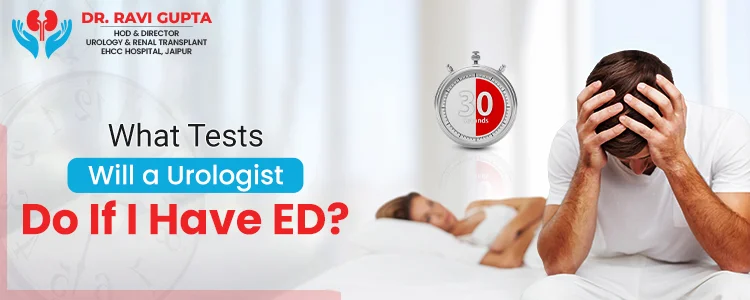
What Tests Will a Urologist Do If I Have ED?
What is Erectile Dysfunction test?
Erectile Dysfunction (ED), a prevalent concern for many men, necessitates a thorough examination by urologists in Jaipur. These specialists, well-versed in male reproductive health, play a pivotal role in diagnosing and addressing ED issues. Here’s an insightful overview of the tests and evaluations conducted by urologists to comprehensively diagnose ED.
Initial Evaluation: The initial assessment encompasses a meticulous review of medical history, medications, and psychological factors influencing ED.
- Detailed Medical History:
- Exploration of personal and family medical history to identify potential hereditary and chronic contributors.
- Discussion on lifestyle factors such as smoking, alcohol, and exercise, considering their impact on erectile function.
- Medication Review:
- Examination of current medications to identify potential side effects contributing to ED.
- Psychological Assessment:
- Delving into emotional well-being, stress, anxiety, and depression as potential psychological contributors.
Physical Examination: A comprehensive physical examination provides insights into overall health, secondary sexual characteristics, and the genital area.
- General Health Assessment:
- Examination for signs of obesity, cardiovascular issues, and other conditions impacting ED.
- Evaluation of Secondary Sexual Characteristics:
- Assessment of hormonal health through examination of body hair distribution and testicular size.
- Examination of the Genital Area:
- Visual inspection and palpation for anomalies or structural issues affecting erectile function.
Blood Tests: Blood tests play a crucial role in identifying hormonal imbalances, diabetes, and other underlying health conditions.
- Hormone Levels Assessment:
- Measurement of testosterone levels and thyroid function tests to identify hormonal imbalances.
- Blood Glucose Levels:
- Testing for diabetes, a potential cause of damage to blood vessels and nerves leading to ED.
- Lipid Profile:
- Assessment of cholesterol levels to identify potential arterial blockages affecting blood flow.
- Complete Blood Count (CBC):
- Identification of underlying health conditions contributing to ED.
- PSA (Prostate-Specific Antigen) Test:
- Assessment of prostate health, considering its impact on erectile function.
Know more about:- PSA Test
Psychological Evaluation: A thorough exploration of stress, anxiety, depression, and relationship dynamics provides a comprehensive understanding of psychological contributors to ED.
- Psychosocial Factors Assessment:
- In-depth discussions about stress, anxiety, depression, and relationship issues.
- Questionnaires and Interviews:
- Structured assessments to identify mental and emotional concerns influencing ED.
Imaging Studies: Doppler ultrasound, penile color Doppler ultrasound, pelvic MRI, and Nocturnal Penile Tumescence (NPT) test aid in visualizing blood flow and identifying structural abnormalities.
- Doppler Ultrasound:
- Measurement of blood flow in penile arteries to identify vascular issues.
- Penile Color Doppler Ultrasound:
- Evaluation of blood flow dynamics during erection for pinpointing causes of ED.
- Pelvic MRI:
- Detection of structural abnormalities or blood flow issues in the pelvic region.
- Nocturnal Penile Tumescence (NPT) Test:
- Monitoring spontaneous erections during sleep to differentiate psychological and physical causes.
Specialized Tests (If Needed): For complex cases, specialized tests like cavernosometry, cavernosography, and nerve conduction studies may be considered.
Conclusion: Urologists employ a holistic approach to diagnose and treat ED, tailoring treatment plans based on precise test results. Early intervention is encouraged to improve outcomes and enhance the quality of life for individuals experiencing ED. Seeking professionals like Dr Ravi Gupta will help from ensuring a comprehensive evaluation and a personalized path towards effective solutions.